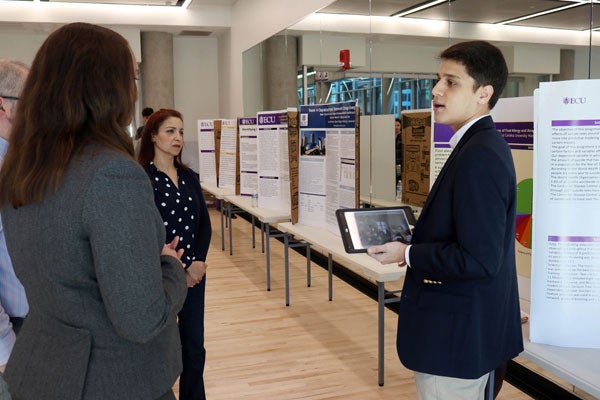FUTURE OF BIG DATA
ECU increasing big data capabilities
Big data – large sets of data that are analyzed to reveal patterns, trends and associations – is becoming big business at East Carolina University.
The topic was discussed April 16 at the 2019 Big Data at Eastern North Carolina Symposium, as data researchers from across the state visited ECU to talk about the future of the field.
The concept of big data has been around for years, but with advancements in computing speed and cloud service technology, researchers are capable of harnessing data sets more efficiently. Big data analytics can help identify new research opportunities, make predictive decisions, and determine efficient ways for organizations to run their businesses and reduce costs.
There is no single technology that encompasses big data analytics. The field uses machine learning, data mining and visualization tools to tell the “big” story that small samples of data – like how many times a patient has visited a hospital, what medication they’re prescribed, and their family medical history – cannot on their own.
ECU researchers are striving to use big data in meaningful ways to provide the region better health care and more effective medical treatment outcomes.

East Carolina University Honors College student Omar S. Taha presents his research on “Prevalence and Patterns of Food Allergy and Anaphylaxis among School Children in Pitt County” at the 2019 Big Data at Eastern North Carolina Symposium.
“Eastern North Carolina is data rich when it comes to health care,” said Huigang Liang, a professor in ECU’s College of Business. “We can use big data to figure out better health care methods, therapies and medical regiments.
“In the past, we haven’t been able to drill down into this data and find the golden nuggets of knowledge hidden away,” he said. “By putting an increased focus on big data and analytics, and providing our students and faculty members the tools they need to do this kind of research, we’ll better serve the population.”
Department of Surgery professor Bill Irish, who serves as the co-director for ECU’s big data and analytics research cluster along with Liang, said the development of the interdisciplinary team has been vital in expanding ECU’s efforts.
“The cluster’s goal from the start has been to develop university-wide support for big data analytics and connect researchers from across departments,” Irish said. “Symposiums like this not only allow us to show off the work we’re doing with big data, but it allows our researchers to meet one another, share their experiences, and discover new research questions.”
ECU is developing its capabilities by partnering with analytics leader SAS Software. SAS provides researchers with its data analytics software and offers teaching materials and onsite training for faculty and staff.
Liz Moran, senior global academic program manager for SAS, said researchers just starting out using big data shouldn’t be afraid of the term.
“I think the most important thing to take away from today is that big data cannot be avoided,” Moran said. “It’s critical to use the cluster approach that ECU is employing and bring together teams of researchers from multiple areas. There’s a starting point for everyone, regardless of your background.”
Tyechia Paul, Barton College’s senior director of business, who made the nearly hourlong drive to campus from Wilson, said she hopes to see big data techniques, tools and visualizations integrated into curriculums across North Carolina’s universities.
“In order to be optimally equipped for their future careers, our students need to be taught what data exists, where to find it, whether or not its meaningful, and how to utilize data to add value to their organizations,” Paul said. “We have to teach them how to navigate these tools and share their data in meaningful ways with the public.”
ECU researchers interested in integrating big data analytics into their work can contact Liang or Irish for more information.
